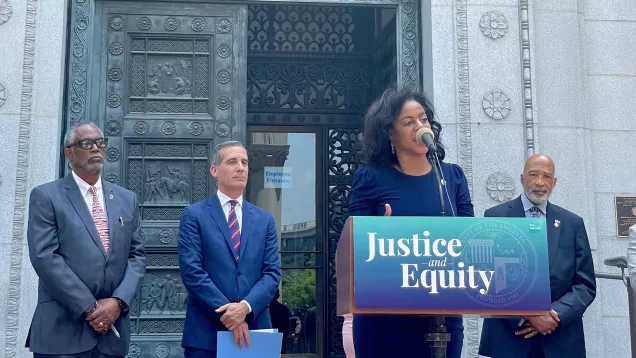
LOS ANGELES - Following their first community meeting, the city’s Reparations Advisory Commission released a survey for Angelenos to share their experiences with institutional racism and their ideas on reparations in Los Angeles. Insights from the survey will guide the Commission’s work. Find the survey here.
“The Reparations Advisory Commission wants to hear from our city,” said Reparations Advisory Commission Chair Michael Lawson, who is also the CEO & President of the LA Urban League. “Community input is crucial to developing a meaningful reparations program. The thoughts collected in this survey will guide our research, outreach and work in creating reparations for Los Angeles.”
"Black Americans have always faced bigotry, racism, and discrimination and we can trace the toll that slavery has taken in their unequal health, wealth, and educational outcomes,” said Mayor Eric Garcetti. “Through this reparations commission, the City of Los Angeles is acknowledging, and seeking to address, the injustices of the past — while working to build a future where all Angelenos are given the opportunity to thrive and reach for their full potential.”
“Reparations work takes all of us,” said LA Civil Rights Executive Director Capri Maddox. “Our Reparations Advisory Commission is working hard to develop a program that can address the generations of harm done to Black Angelenos, but we must hear from the community. Whether through a community meeting or this survey, speak up - because your voice matters.”
The survey, which is open for anyone in the City of Los Angeles to complete, was released following the Reparations Advisory Commission’s first community meeting. “Homecoming” welcomed Angelenos on Zoom and Facebook Live to share their stories of systemic racism and learn more about the reparations pilot program being developed.
The survey asks respondents to share their vision for reparations in Los Angeles, issue areas reparations should address, and the possibility of future reparative efforts for other harms done. This could include the mistreatment of indigenous communities, the Chinese Massacre of 1871, and the displacement of Latino families from Chavez Ravine. Reparations can take monetary and non-monetary forms, but is focused on meaningful acknowledgement and repair of harms done.
The Reparations Advisory Commission is also seeking a project manager, academic partner, and development partner to support its work. More information and opportunities to apply for the positions can be found here.
Click here to take the survey.
Click here to learn more about the city’s Reparations Advisory Commission.